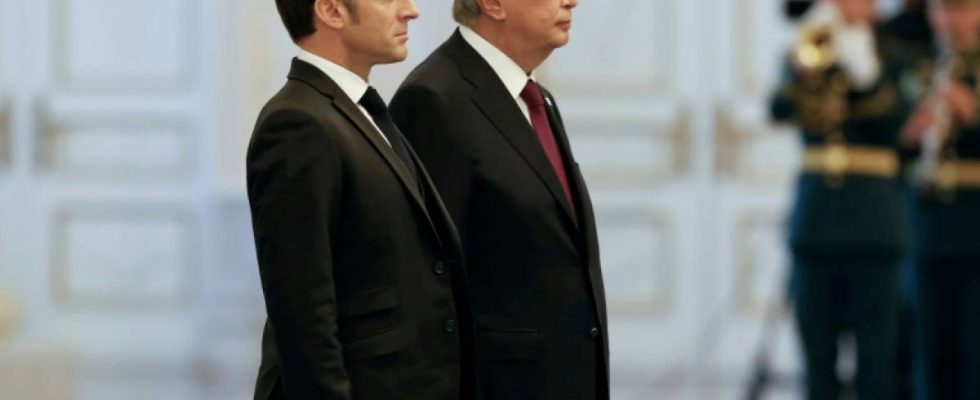French Presidents Emmanuel Macron (left) and Kazakh Presidents Kassym-Jomart Tokaïev (right) on November 1, 2023 in Astana (POOL / Stanislav FILIPPOV)
French President Emmanuel Macron called on Wednesday in Kazakhstan for a strengthening of the “strategic partnership” with the largest economy in Central Asia, which is trying to diversify its links against a backdrop of a struggle for influence between great powers in this region.
On the first day of this visit which will also take him to neighboring Uzbekistan, Mr. Macron underlined in Astana, the Kazakh capital, the “vigor” of the relationship with this former Soviet republic rich in natural resources, while emphasizing the ” need to complete and accelerate it.
He also welcomed the Kazakh “refusal” to take the “road of vassalization behind a few powers (…) in a world where the great powers would like to become hegemonic and where regional powers become unpredictable”.
“I do not underestimate the geopolitical difficulties, the pressures, sometimes the jostling to which you may be subjected. France looks at you, with great consideration, respect and friendship,” he said. he time when Russia’s traditional influence in Central Asia is now contested in particular by China, the European Union and Turkey.
“France is our key and reliable partner in the European Union,” said Kazakh leader Kassym-Jomart Tokaïev, while Astana is one of the main suppliers of uranium to France.
Emmanuel Macron recalled “the great importance” of developing a “median corridor across the Caspian Sea” in order to “connect Europe and Central Asia”, an alternative to Chinese and Russian logistics routes in this landlocked region.
– Military radars –
Arriving in the snow in Astana, the Kazakh capital with futuristic architecture built in the middle of the steppes, Mr. Macron is the first French president to visit Kazakhstan since François Hollande in 2014.
Emmanuel Macron was accompanied by a large economic delegation including the CEOs of EDF (electricity), Suez (water) and Orano (uranium).
Several contracts have been signed in the sectors of strategic minerals – with cooperation in geological research -, pharmaceutical, energy – with the joint development of a major wind farm with TotalEnergies – or even industrial – with the group Alstom– and cultural, to promote the French language.
The Elysée also announced the supply of GM 400 military radars manufactured by Thalès “in the service of the sovereignty” of Kazakhstan, which will be assembled in this country sharing more than 7,500 kilometers with Russia and member of a common military alliance.
As the Kazakh Minister of Energy confirmed on Wednesday, EDF is one of the candidates for the project of the first nuclear power plant in Kazakhstan, the construction of which must be confirmed by referendum by the end of the year.
France is the fifth foreign investor in Kazakhstan, ahead of China, notably due to the establishment of the TotalEnergies oil group, which jointly exploits the important Kachagan deposit in the Caspian Sea.
Bilateral trade amounted to 5.3 billion euros in 2022, mainly in hydrocarbons. Kazakhstan also supplies France with nearly 40% of its uranium.
– Moscow observes –
Emmanuel Macron (l) caresses Tazi greyhounds, Kazakh hunting dogs, during an exhibition in Astana, November 1, 2023 (AFP / Ludovic MARIN)
Critical metals, essential to the energy transition and of which the region is rich, also feature prominently in discussions with Uzbekistan, which is among the main suppliers of uranium to France.
The uranium specialist Orano, which already operates a mine in Kazakhstan, also wants to increase its presence, while Kazakhstan alone produces 43% of total production, according to the World Nuclear Association.
Central Asia, long a Russian precinct, is ardently courted by the great powers at a time when Russia is monopolized by its military offensive in Ukraine.
In this game of influences, neighboring China, with its major “New Silk Roads” infrastructure project, has taken a head start. But Europe and Turkey are also advancing their pawns, while Turkish President Recep Tayyip Erdogan will be in Astana on Friday.
Building on this enthusiasm, Kazakhstan and Uzbekistan are banking on economic openness and balanced diplomacy to assert themselves, even if Moscow remains an essential partner.
Kremlin spokesman Dmitry Peskov said Wednesday that Kazakhstan was a “sovereign country developing its diplomatic relations as it sees fit.”
Beyond their economic openness, Kazakhstan and Uzbekistan remain authoritarian regimes where the repression of demonstrations is often violent, despite a stated desire for political liberalization.

